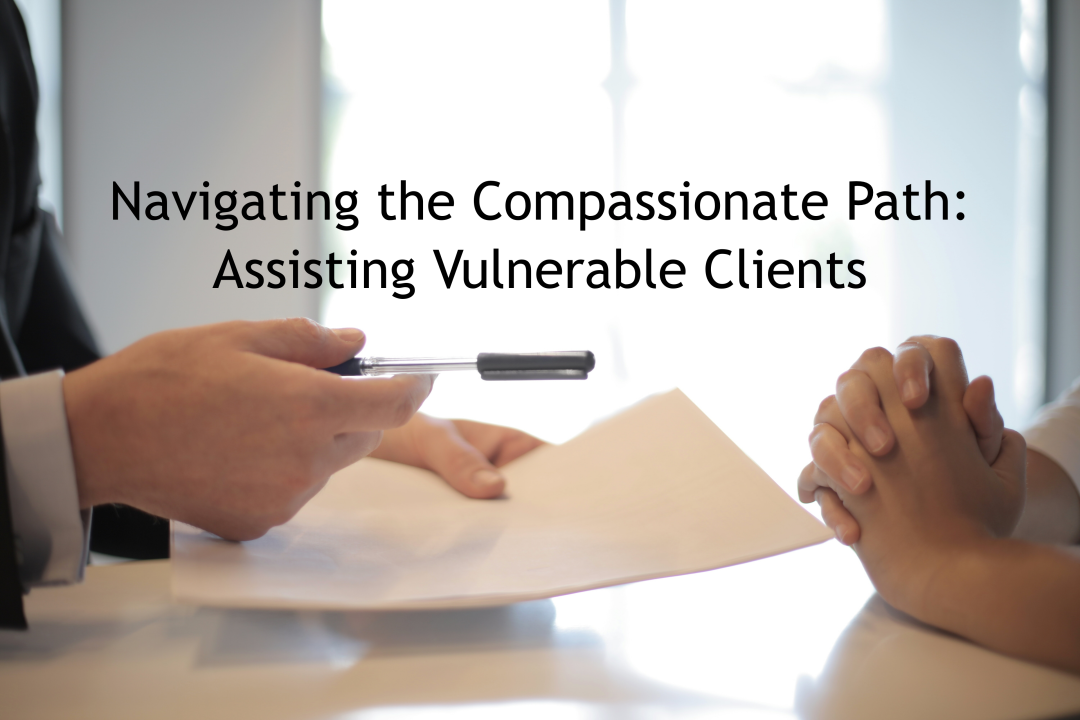For over a decade I have been working in the field of immigration and human rights. Over the years I have had the opportunity to deal with many clients and work on many cases. I had my fair share of difficult cases. Sometimes it’s not the facts of the cases or the relevant laws that are difficult. Sometimes the clients are vulnerable and it makes the case difficult. I met many solicitors and immigration practitioners who actually never dealt with a client who had multiple miscarriages or been persecuted or been a victim of domestic violence or been a victim of forced marriage or been a victim of FGM etc. Any one of these tragedies can deeply scar a person and make them vulnerable.
I cannot write a comprehensive guide to deal with venerable clients but I certainly can peak into my experience and share some thoughts as to some of the things I think all immigration lawyers or advisors should be mindful of.
Immigration lawyers are critical in representing and assisting persons who are navigating the difficult realm of immigration law. They usually encounter vulnerable clients who demand special care and attention in their practice. Recognising the special problems of supporting vulnerable clients, this article tries to provide broad recommendations for immigration lawyers working in the United Kingdom. Lawyers can better serve their client’s interests and ensure fair and just outcomes by adhering to ethical standards, adopting effective communication tactics, and understanding the legal frameworks governing vulnerability.
What is a vulnerable client?
Individuals who experience considerable obstacles or barriers to efficiently navigating the immigration system or protecting their own rights are considered vulnerable clients. Vulnerability can manifest in a variety of ways, including, but not limited to, the following:
Mental or Physical Health Challenges: Clients suffering from mental diseases, physical disabilities, or illnesses that may impair their cognitive or physical skills to understand and participate in the immigration process.
Victims of Trafficking: Individuals who have been trafficked for a variety of reasons, including forced labour, sexual exploitation, or other forms of exploitation. Because of the trauma they have endured, they may require specialised care.
Survivors of Domestic Violence: Clients who have endured domestic violence or abuse, which can have serious consequences for their immigration status and necessitate special care to protect their safety and well-being.
Minors and Unaccompanied Children: Children and young people under the age of 18, particularly those travelling alone or separated from their families. They require extra safeguards and protection to guarantee that their best interests are protected.
Elderly Individuals: Older people may encounter age-related obstacles such as decreased mobility, health issues, or language barriers. They may require additional assistance to efficiently navigate the immigration processes.
Language and Cultural Barriers: Clients who have limited proficiency in the language of the host country or may come from cultural backgrounds where face challenges in understanding and navigating the complexities of the immigration process.
Socioeconomic Disadvantage: Clients who face financial constraints or limited resources, making it difficult for them to access legal services or adequately represent themselves in immigration proceedings.
Discrimination and Marginalisation: Individuals who may face discrimination based on their race, ethnicity, gender, sexual orientation, religion, or other protected characteristics, leading to increased vulnerability within the immigration system.
It is important to note that this is not an exhaustive list, and each case should be reviewed individually, taking the client’s personal circumstances and needs into account. Immigration lawyers must approach each client with care, empathy, and knowledge of their specific vulnerabilities in order to provide appropriate support and advice. It is critical to recognise that vulnerability is varied and complex. Lawyers must approach each case with sensitivity, respect, and an understanding that clients may not always reveal their weaknesses right away. Building trust and creating a safe, nonjudgmental environment is critical in understanding and meeting the needs of vulnerable clients.
What can be done?
Lawyers can better serve their client’s interests and ensure fair and just treatment by adhering to ethical standards, adopting effective communication tactics, and understanding the legal frameworks governing vulnerability.
Recognising Vulnerability: Immigration lawyers must be able to identify signs of vulnerability in their clients. These may include but are not limited to, individuals with mental health conditions, victims of trafficking, survivors of domestic violence, minors, the elderly, and those with language barriers. Lawyers should approach each case with sensitivity and empathy, fostering an environment of trust and understanding.
Maintaining Confidentiality and Trust: Client confidentiality is paramount when dealing with vulnerable individuals. Lawyers should ensure they have explicit consent to represent the client and discuss their case. They should also communicate the limits of confidentiality, explaining situations where disclosure may be required by law or for the client’s best interests. Establishing trust is essential for effective representation.
Effective Communication Strategies:
- Language Barriers: Immigration lawyers should engage interpreters or translators when necessary to ensure effective communication with clients who do not speak English proficiently. Utilizing professional interpreters helps prevent misinterpretation and ensures accurate transmission of information.
- Clear and Accessible Language: Lawyers should use plain and accessible language when communicating complex legal concepts to vulnerable clients. Avoiding jargon and explaining legal processes in a clear manner enables clients to make informed decisions.
Understanding Legal Frameworks:
- Human Rights and Equality Legislation: Immigration lawyers must have a comprehensive understanding of human rights and equality legislation, such as the European Convention on Human Rights and the Equality Act 2010. Familiarity with these frameworks will assist in advocating for the rights of vulnerable clients effectively.
- Asylum and Protection Laws: Lawyers should be well-versed in asylum and protection laws to provide appropriate legal advice and representation to vulnerable clients seeking refuge from persecution or violence. Knowledge of relevant UK legislation and case law is essential in building a strong case.
Collaborating with Support Organisations: Working closely with support organisations can enhance the assistance provided to vulnerable clients. Lawyers should establish networks with relevant charities, NGOs, and community groups specialising in supporting vulnerable individuals. These collaborations can offer additional resources, expert advice, and social support to clients.
Importance of having a policy specifically addressing the handling of vulnerable clients is crucial for law firms for several reasons:
I have had the opportunity to meet many immigration lawyers and advisors. To my surprise, a great many of them either do not have a policy for dealing with vulnerable clients at their firms or many of them are not aware of the firm’s policy. Having a policy dedicated to dealing with vulnerable clients is essential for law firms to ensure ethical practice, promote consistent and standardised approaches, manage risks, enhance professional development, maintain a positive reputation, comply with legal requirements, and ultimately provide the best possible representation and support to vulnerable individuals.
Ethical Responsibility: Law firms have an ethical obligation to provide competent and diligent representation to all clients, including vulnerable individuals. A policy ensures that the firm is committed to upholding these ethical standards and prioritising the needs of vulnerable clients.
Consistency and Standardization: A policy provides a framework for consistent and standardised practices when working with vulnerable clients. It ensures that all lawyers and staff within the firm are aware of the necessary protocols and procedures, promoting uniformity in the level of care and support provided.
Risk Management: Dealing with vulnerable clients often involves unique challenges and potential risks. Having a policy in place helps mitigate these risks by providing guidelines on how to handle sensitive information, establish boundaries, manage potential conflicts of interest, and address any potential issues that may arise during representation.
Training and Professional Development: A policy on vulnerable clients serves as a foundation for training programs and ongoing professional development within the firm. It enables lawyers and staff to acquire the necessary knowledge and skills to effectively serve vulnerable clients, enhancing their competence and sensitivity when dealing with such cases.
Reputation and Client Trust: Demonstrating a commitment to serving vulnerable clients can enhance a law firm’s reputation and foster client trust. Having a policy in place sends a clear message to clients, the legal community, and potential stakeholders that the firm is dedicated to providing inclusive and quality legal services to all individuals, irrespective of their vulnerabilities.
Compliance with Legal and Regulatory Requirements: Jurisdictions may have specific legal and regulatory requirements concerning the treatment of vulnerable clients. A policy ensures that the law firm complies with these obligations, reducing the risk of disciplinary action or legal consequences.
Client Retention and Referrals: Satisfied clients are more likely to refer others to the firm and continue their relationship in the long term. By demonstrating a commitment to supporting vulnerable clients through a well-defined policy, law firms can build stronger relationships, attract new clients, and benefit from positive word-of-mouth referrals.
Helping vulnerable clients navigate the immigration system necessitates a multidimensional approach that includes legal knowledge, compassion, and ethical considerations. Immigration attorneys in the United Kingdom should attempt to recognise vulnerability, build trust, communicate effectively, and grasp the legal frameworks in place. Lawyers can give the best possible counsel to vulnerable clients by following this general guidance and staying up to date on developing immigration policy and legislation.



